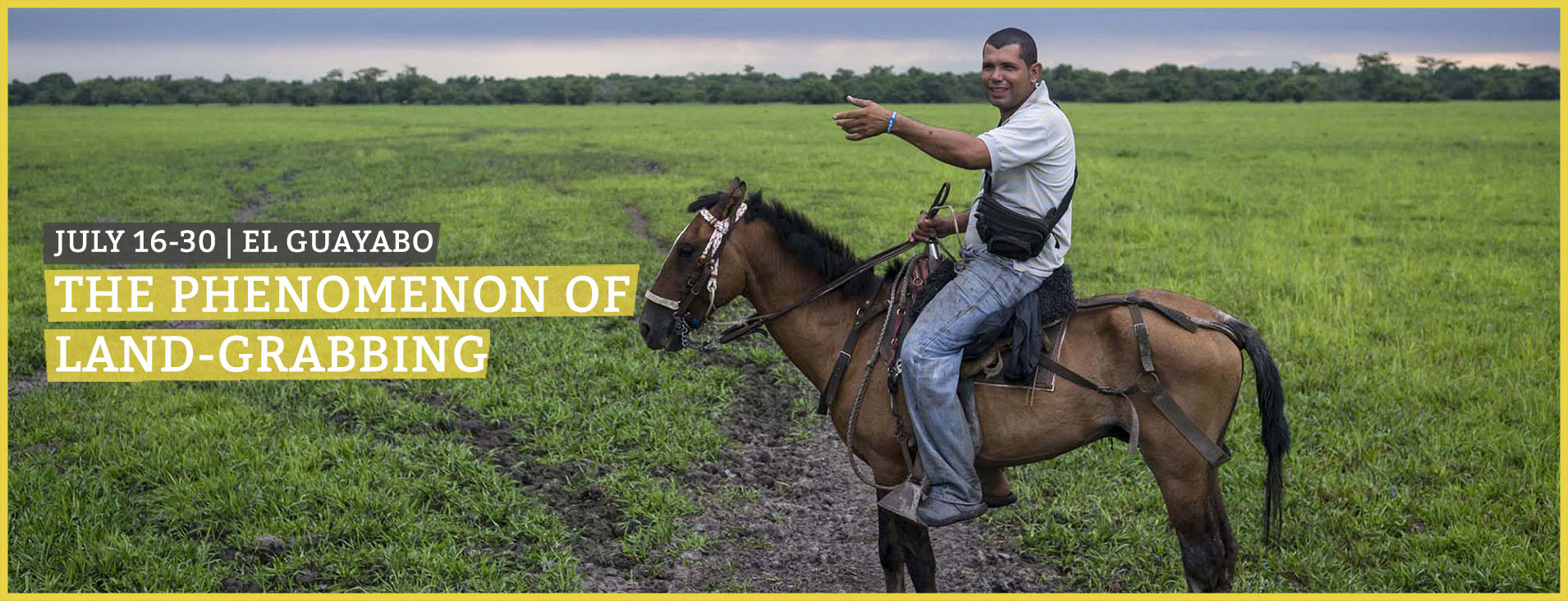CPTnet
15 January 2015
COLOMBIA: Three
different places, themes, CPT Colombia delegations for 2016. Sign up now!

Las
Pavas community members have been repeatedly displaced from their land over the
last twenty years by various different armed actors, the most recent being
Aportes San Isidro, a palm oil company. The palm oil industry is
particularly powerful in the region, and uses a private security company to
terrorize the community members, slashing their crops, burning down their
houses, and poisoning their animals. Through this example, we will help
participants make links between Colombia and the North, as the presence of
multinational corporations in Colombia has vastly increased since signing the
Free Trade Agreement with Canada, the United States, and various European
countries.
Las
Pavas was recognized by the Colombian State in 2013 with the National Peace
Prize for their commitment to nonviolence. Juliana Vargas of the National Peace
Prize selection committee in a visit with the community told them, “You were
selected by a committee from 89 nominated national processes who are also doing
amazing work for peace. But we chose you because you showed us a nonviolent way
forward. You are our example.”
Participants
will spend some time in the community of Las Pavas, hearing their testimony of
over twenty years of peaceful resistance through story and song. They will spend their first few days in
Bogotá, Colombia’s capital, learning the national context. From Bogotá we
travel to Barrancabermeja, CPT’s base city, a city alive with social movements
and a history steeped in the defence of human rights and dignity here we will
listen to the voices of friends and partners developing an analysis before
heading off to Las Pavas.

The
250 families of El Guayabo have been working the land to provide sustenance for
themselves for over thirty years. They have lived peaceably up until two
years ago when they found themselves in the middle of a land dispute. By
standing up for their right to remain on the land, members of the Guayabo
community have received death threats, received brutal treatment from the
police, and face a daily fear of displacement from their homes.
Land
is a large part of the Colombian civil war, one of the longest in world’s
history. The conflict has resulted in over six million internally
displaced people, who are often constantly on the move looking for land to
provide for their families. The majority of these people are peasant
farmers, Afro-Colombians, and Indigenous Peoples, whose land is of political
and economic interest to the parties of the conflict. Often large
landowners or multinational corporations take over the land and use it for cash
crops for export, contributing to a global trend toward food insecurity.
Participants will
have the opportunity to visit El Guayabo and witness the geopolitics of
land-grabbing first hand and stand in solidarity with the community and their
struggle to remain on their land. They
will spend their first few days in Bogotá, Colombia’s capital, learning the
national context. From Bogotá we travel to Barrancabermeja, CPT’s base city, a
city alive with social movements and a history steeped in the defence of human
rights and dignity – here we will listen to the voices of friends and partners
developing an analysis before heading off to El Guayabo.

Garzal
and Nueva Esperanza are two farming communities situated side by side along the
banks of the Magdalena River. These farmers make their living cultivating
rice, plantain, yucca, many varieties of tropical fruits, and lastly, their
famous cacao. This cocoa bean is one of the best in Colombia and Garzal exports
to Swiss chocolate companies, who sell their product around the world.
Unfortunately,
these fertile and prosperous lands have been at the epicentre of a civil war in
Colombia for over 50 years. Constant threats from demobilized paramilitaries
make life difficult on the land, and the farming community lives in a perpetual
state of fear. The state has declared that these lands belong to small farmers,
but the titles are caught up in corrupt bureaucracy.
Participants will
have the opportunity to visit Garzal and Nueva Esperanza, where they will meet
community members and engage in their experience. These communities
attribute their perseverance to their strong Christian faith, and as the
country moves through a process of peace negotiations, we will hear from them
about how that faith interacts with the conflict and what forgiveness and
reconciliation means for them. Participants will spend their first few days in
Bogotá, Colombia’s capital, learning the national context. From Bogotá we
travel to Barrancabermeja, CPT’s base city, a city alive with social movements
and a history steeped in the defence of human rights and dignity – here we will
listen to the voices of friends and partners developing an analysis before
heading off to Garzal and Nueva Esperanza.
Space is limited. Apply Now!
Fundraising Expectation
US$ 2800, which includes round-trip airfare from a designated U.S. or Canadian city. Those planning to travel from other countries, write to us for more information.
Scholarships
CPT has limited funds available to assist applicants who otherwise couldn’t participate. CPT is committed to undoing racism and will give preference to funding assistance applicants from communities which have been disadvantaged by racism.
Some physical rigors are involved in most CPT delegations, which could involve hiking in mud, heat or mountains, hours-long trips by boat or truck, and generally long days.
With the peace agreements nearing completion, CPT Colombia continues to support these communities and their resolve to remain on their land. The struggle is not over but the work of CPT and their partners is bearing fruit. Keep watering the trees!



